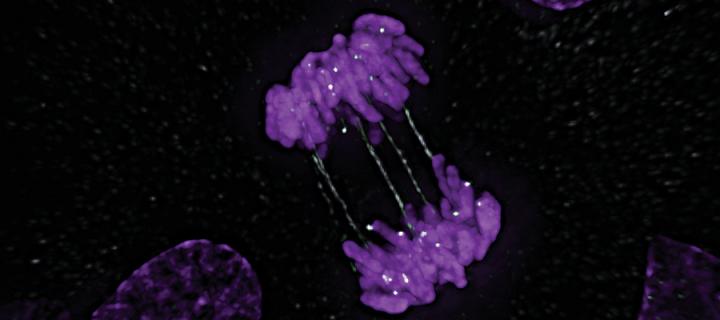Studies shed light on health impacts of key cell division machinery
Two new studies shed new light on how defects in cell division can affect normal growth and development of the body and can lead to diseases such as cancer: October 2016

During cell division, chromosomes change shape to become compact, rod-like structures so that DNA can separate equally between daughter cells. This new research studies the consequences of faults in the cellular machinery involved in this chromosome packaging. The studies focused on condensins, key protein complexes needed in all cells to ensure proper chromosome structure. They find surprisingly that there are specific effects on particular cell types.
In the first study, researchers at the University of Edinburgh found that defective condensin II caused abnormal cell division specifically in specialised blood cells called T cells. Additionally, in mice, this was associated with the development of T-cell lymphoma, connecting chromosome condensation to the initiation of cancer.
In the second study, researchers found that both condensin I and II are crucial for normal brain development. They found changes in several condensin genes in individuals with microcephaly. The team found that these changes led to increased levels of DNA tangles as chromosomes separated, reducing the efficiency of cell division. Such chromosome separation problems are thought to lead to reduced numbers of brain cells generated during early life, leading to the reduced brain size seen in microcephaly.
Both studies are published in the journal Genes and Development.
Dr Andrew Wood, of the Medical Research Council Human Genetics Unit at the University, said: “Changes in chromosome structure are an iconic feature of dividing cells. These studies highlight how defects in this process can underlie disease, and suggests that we still have much to learn about how different types of cell undergo division.”
Professor Andrew Jackson, of the Medical Research Council Human Genetics Unit at the University, said: “Condensins are fundamentally important for packaging our chromosomes. This is the first time that changes in the genes that encode the condensins have been found to cause a developmental disorder.”
Carol-Anne Martin; Jennie E. Murray; Paula Carroll; Andrea Leitch; Karen J. Mackenzie; Mihail Halachev; Ahmed E. Fetit; Charlotte Keith; Louise S. Bicknell; Adeline Fluteau; Philippe Gautier; Emma A. Hall; Shelagh Joss; Gabriela Soares; João Silva; Michael B. Bober; Angela Duker; Carol A. Wise; Alan J. Quigley; Shubha R. Phadke; The Deciphering Developmental Disorders Study; Andrew J. Wood; Paola Vagnarelli; Andrew P. Jackson Genes & Dev. October 01, 2016; 30(19):2158 doi:10.1101/gad.286351.116
Condensin II mutation causes T-cell lymphoma through tissue-specific genome instability
Jessica Woodward; Gillian C. Taylor; Dinesh C. Soares; Shelagh Boyle; Daoud Sie; David Read; Keerthi Chathoth; Milica Vukovic; Nuria Tarrats; David Jamieson; Kirsteen J. Campbell; Karen Blyth; Juan Carlos Acosta; Bauke Ylstra; Mark J. Arends; Kamil R. Kranc; Andrew P. Jackson; Wendy A. Bickmore; Andrew J. Wood Genes & Dev. October 01, 2016; 30(19):2173 doi:10.1101/gad.284562.116


